HMS Ghurka (1907) facts for kids

HMS Ghurka
|
|
Quick facts for kids History |
|
|---|---|
| Name | HMS Ghurka |
| Builder | Hawthorn Leslie and Company, Newcastle upon Tyne |
| Laid down | 6 February 1906 |
| Launched | 29 April 1907 |
| Commissioned | December 1908 |
| Fate | Mined, 8 February 1917 |
| General characteristics | |
| Class and type | Tribal-class destroyer |
| Displacement |
|
| Length |
|
| Beam | 25 ft 6 in (7.77 m) |
| Draught | 8 ft 6 in (2.59 m) |
| Propulsion |
|
| Speed | 33 kn (38 mph; 61 km/h) |
| Range | 1,460 nmi (2,700 km; 1,680 mi) at 15 kn (28 km/h; 17 mph) |
| Complement | 72 |
| Armament | 5 × QF 12-pounder guns, 2 × 18 inch (450 mm) torpedo tubes |
HMS Ghurka was a special type of fast warship called a destroyer. It was built in 1907 for the Royal Navy, which is the United Kingdom's navy.
This ship was part of the Tribal-class of destroyers. During the First World War, HMS Ghurka was part of the Dover Patrol. It helped sink a German submarine in 1915. Sadly, the ship was sunk by a German mine in 1917.
Contents
Building and Design of HMS Ghurka
HMS Ghurka was one of five Tribal-class destroyers ordered in 1905–1906. These ships were designed to be very fast. The First Sea Lord, who was a top naval officer named "Jackie" Fisher, wanted destroyers that could go at least 33 knots (about 38 miles per hour). They also had to use steam turbine engines and run on oil.
Ship's Power and Speed
The Ghurka was built by Hawthorn Leslie and Company in Hebburn, England. It used steam turbines powered by five large boilers. These turbines turned three propellers, giving the ship a lot of power. This design helped it reach its high speed.
Weapons on Board
The ship was armed with three 12-pounder guns. These guns were about 3 inches (76 mm) wide. It also had two 18-inch (450 mm) torpedo tubes. Torpedoes are underwater missiles. Two of the guns were at the front of the ship, and one was at the back. Before the ship officially joined the navy, two more 12-pounder guns were added.
Key Dates for HMS Ghurka
- Laid Down: Construction started on 6 February 1906.
- Launched: The ship was floated for the first time on 29 April 1907.
- Completed: It was finished and ready for service in December 1908.
During its trials, the Ghurka reached an average speed of 33.91 knots over a six-hour test run.
From 1910 to 1913, HMS Ghurka was part of the First Destroyer Flotilla. A flotilla is a group of small warships. After that, it joined the Fourth Flotilla, based in Portsmouth. In October 1913, the Tribal-class ships were officially called the F class. So, the letter "F" was painted on the front of Ghurka.
Role in World War I
The Tribal-class destroyers, including Ghurka, were not designed for very long journeys. Because of this, when World War I started, Ghurka joined the Sixth Destroyer Flotilla. This group was based in Dover and was part of the Dover Patrol. The Dover Patrol protected the important shipping lanes in the Straits of Dover.
On 23 August 1914, Ghurka was damaged in a crash with another Tribal-class destroyer, HMS Cossack. It had to go into dry dock for repairs.
Sinking of a German Submarine
A big moment for Ghurka happened on 4 March 1915. A German submarine, U-8, got caught in special nets. These nets were laid across the Straits of Dover to detect submarines. A fishing boat called Roburn spotted the disturbance in the net. It called for help from nearby destroyers, including Ghurka.
Other ships tried to force the submarine up. Then, Ghurka used its own special explosive device to make the German submarine come to the surface. After a short fight, the submarine's crew gave up, and the submarine was sunk by its own crew.
Other Duties and Final Fate
The Dover Patrol also helped attack enemy positions on land. On 23 August 1915, Ghurka helped protect other ships during an attack on Zeebrugge.
Sadly, HMS Ghurka was sunk on 8 February 1917. It hit a naval mine placed by the Germans near Dungeness. Out of its crew, only five people survived. Seventy-four crew members were lost. The wreck of HMS Ghurka is now at the bottom of the sea, about 30 meters deep. It is a "protected place" to honor those who were lost.
 | Kyle Baker |
 | Joseph Yoakum |
 | Laura Wheeler Waring |
 | Henry Ossawa Tanner |

